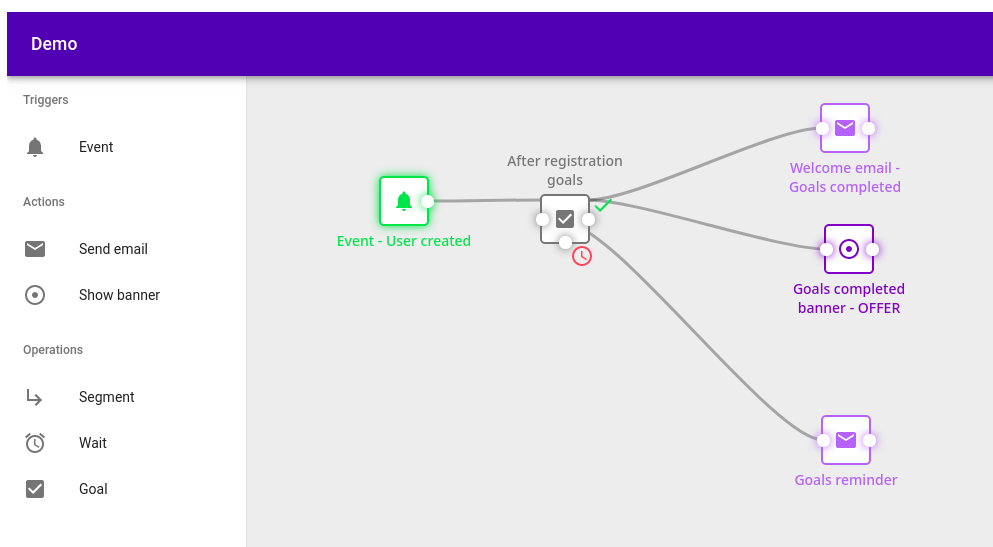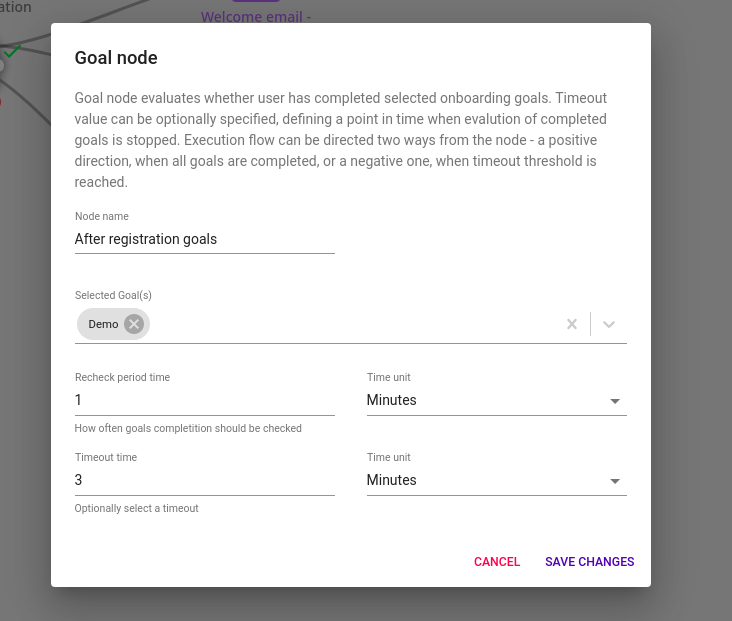remp / crm-onboarding-module
CRM Onboarding Module
Installs: 39 683
Dependents: 1
Suggesters: 0
Security: 0
Stars: 0
Watchers: 7
Forks: 0
Open Issues: 0
pkg:composer/remp/crm-onboarding-module
Requires
- php: ^8.1
- dev-master
- 4.4.0
- 4.3.0
- 4.2.0
- 4.1.0
- 4.0.0
- 3.7.0
- 3.6.0
- 3.5.0
- 3.4.0
- 3.3.0
- 3.2.0
- 3.1.0
- 3.0.0
- 2.11.0
- 2.10.0
- 2.9.0
- 2.8.0
- 2.7.0
- 2.6.0
- 2.5.0
- 2.4.0
- 2.3.0
- 2.2.0
- 2.1.0
- 2.0.0
- 1.2.0
- 1.1.0
- 1.0.0
- 1.0.0-beta2
- 1.0.0-beta1
- 0.39.0
- 0.38.0
- 0.37.0
- 0.36.0
- 0.35.0
- 0.34.0
- 0.33.0
- 0.32.0
- 0.31.0
- 0.30.0
- 0.29.0
- 0.28.0
- 0.27.0
- 0.26.0
- 0.25.0
- 0.24.0
- 0.23.0
- 0.22.0
- 0.21.0
- 0.20.0
- 0.18.0
- 0.17.0
- 0.16.0
- 0.15.0
- 0.14.0
- 0.13.0
- 0.12.0
- 0.11.0
- 0.10.0
- 0.9.0
- 0.8.2
- 0.8.1
- 0.8.0
- 0.7.0
This package is auto-updated.
Last update: 2026-02-12 09:03:52 UTC
README
Onboarding module lets you define goals that your users should achieve. The goal is merely a label with flag describing whether it was finished by a user or not.
Once the goal is defined, head to the Scenario builder and create a scenario including "Goal" element. The element can be configured with following properties:
- Which goals need to be completed for element to trigger "success" branch.
- How often CRM should check whether goals are completed.
- How long CRM should wait (timeout) before giving up on goal and triggering "fail" branch.
Installing module
We recommend using Composer for installation and update management.
composer require remp/crm-onboarding-module
Enabling module
Add installed extension to your app/config/config.neon file.
extensions: - Crm\OnboardingModule\DI\OnboardingModuleExtension
When it's added, generate ACL for newly created module.
php bin/command.php user:generate_access php bin/command.php api:generate_access php bin/command.php application:seed
At this point you (superadmin) should be able to define new goals via People - Onboarding goals admin menu (/onboarding/onboarding-goals-admin/) and internal API token should have access to the exposed API endpoints.
If you need other roles to access goal definition, you can assign access to roles at People - Admin rights page (/users/admin-group-admin/).
Completing goals
The completion of the goal can differ based on the type of goal. Currently we plan to support two types of goals:
- Simple. These type of goals have to be completed explicitly for each user by calling onboarding-goals/complete API endpoint.
- Beam (not available yet). These type of goals have Beam event defined as a trigger. Once the event is submitted to Beam, goal will be automatically completed for given user in CRM.
Segments of users with active onboarding goals
Command php bin/command.php application:seed automatically generates segments for an onboarding goals.
- Generated is only configuration and SQL query; rest is in the hands of SegmentModule.
- These segments are locked so users cannot edit them via CRM administration.
- Each onboarding goal has it's own segment.
Users will be part of the goal's segment if they:
- are active,
- have active onboarding goal (entry in
user_onboarding_goalstable; not completed or timed out).
Note: Activation of the onboarding goal for the user should be handled by your module or you can create scenario in ScenariosModule. Scenario which will generate entry for each user which enters scenario's onboarding goal node (handled by Crm\ScenariosModule\Events\OnboardingGoalsCheckEventHandler).
Real-time segments within REMP Campaign
If you are using CRM segments in REMP Campaign, you'll need to enable handler which updates onboarding goal segments' cache in REMP Campaign. Otherwise you'll encounter situations where user completed goal but he still sees campaign's banner (he is part of cached segment).
Note: Module RempCampaignModule has to be installed and enabled.
Add prepared handler into the services part of the config of your module:
services: - Crm\RempCampaignModule\Events\UserOnboardingGoalEventsHandler
And enable listeners for changes to user's onboarding goals in your modules (eg. ExampleModule\ExampleModule.php):
namespace Crm\ExampleModule; class ExampleModule extends \Crm\ApplicationModule\CrmModule { //... public function registerEventHandlers(\League\Event\Emitter $emitter) { //... // catch user onboarding events & handle them in RempCampaign's handler $emitter->addListener( \Crm\OnboardingModule\Events\UserOnboardingGoalCreatedEvent::class, $this->getInstance(\Crm\RempCampaignModule\Events\UserOnboardingGoalEventsHandler::class) ); $emitter->addListener( \Crm\OnboardingModule\Events\UserOnboardingGoalCompletedEvent::class, $this->getInstance(\Crm\RempCampaignModule\Events\UserOnboardingGoalEventsHandler::class) ); $emitter->addListener( \Crm\OnboardingModule\Events\UserOnboardingGoalTimedoutEvent::class, $this->getInstance(\Crm\RempCampaignModule\Events\UserOnboardingGoalEventsHandler::class) ); //... } //... }
API documentation
All examples use http://crm.press as a base domain. Please change the host to the one you use
before executing the examples.
All examples use XXX as a default value for authorization token, please replace it with the
real tokens:
- API tokens. Standard API keys for server-server communication. It identifies the calling application as a whole.
They can be generated in CRM Admin (
/api/api-tokens-admin/) and each API key has to be whitelisted to access specific API endpoints. By default the API key has access to no endpoint. - User tokens. Generated for each user during the login process, token identify single user when communicating between
different parts of the system. The token can be read:
- From
n_tokencookie if the user was logged in via CRM. - From the response of
/api/v1/users/loginendpoint - you're free to store the response into your own cookie/local storage/session.
- From
API responses can contain following HTTP codes:
| Value | Description |
|---|---|
| 200 OK | Successful response, default value |
| 400 Bad Request | Invalid request (missing required parameters) |
| 403 Forbidden | The authorization failed (provided token was not valid) |
| 404 Not found | Referenced resource wasn't found |
If possible, the response includes application/json encoded payload with message explaining
the error further.
POST /onboarding-goals/complete
API call completes simple goal for specific user.
Headers:
| Name | Value | Required | Description |
|---|---|---|---|
| Authorization | Bearer String | yes | Bearer token. |
Body:
{ "goal_code": "demo", // String; required; code of the simple goal "user_id": 301109 // Integer; required; ID of user completing the goal }
Examples:
curl
curl -X POST \ http://crm.press/api/v1/onboarding-goals/complete \ -H 'Content-Type: application/javascript' \ -H "Authorization: Bearer XXX" \ -d '{ "goal_code": "demo", "user_id": 301109 }'
raw PHP
$payload = [ "goal_code" => "demo", "user_id" => 301109, ]; $jsonPayload = json_encode($payload); $context = stream_context_create([ 'http' => [ 'method' => 'POST', 'header' => "Content-Type: type=application/json\r\n" . "Accept: application/json\r\n" . "Content-Length: " . strlen($jsonPayload) . "\r\n" . "Authorization: Bearer XXX", 'content' => $jsonPayload, ] ] ); $response = file_get_contents("http://crm.press/api/v1/onboarding-goals/complete", false, $context); // process response (raw JSON string)
Response:
{ "status": "ok" }
GET /onboarding-goals/list
Endpoint to list available all goals.
Headers:
| Name | Value | Required | Description |
|---|---|---|---|
| Authorization | Bearer String | yes | Bearer token. |
Examples:
curl
curl -X GET \ http://crm.press/api/v1/onboarding-goals/list \ -H 'Content-Type: application/javascript' \ -H "Authorization: Bearer XXX"
raw PHP
$context = stream_context_create([ 'http' => [ 'method' => 'GET', 'header' => "Content-Type: type=application/json\r\n" . "Accept: application/json\r\n" . "Authorization: Bearer XXX", ] ] ); $response = file_get_contents("http://crm.press/api/v1/onboarding-goals/list", false, $context); // process response (raw JSON string)
Response:
{ "status": "ok", "goals": [ { "name": "Demo", // name of the goal (to display) "code": "demo", // code of the goal (for backend communication) "type": "simple" // type of goal }, // ... ] }


